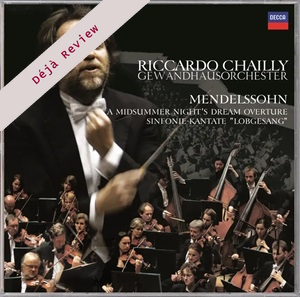Déjà Review: this review was first published in July 2007 and the recording is still available.

Felix Mendelssohn (1809-1847)
A Midsummer Night’s Dream Overture, Op. 21 (1826)
Symphony No. 2 ‘Lobgesang‘ Op. 52 (original version, 1840)
Anne Schwanewilms, Petra-Maria Schnitzer (sopranos), Peter Seiffert (tenor)
Gewandhaus Chorus, Leipzig Opera Chorus
Leipzig Gewandhaus Orchestra/Riccardo Chailly
rec. 2005, Gewandhaus, Leipzig, Germany
Decca 475 6939 [69]
Since the Gewandhaus was Mendelssohn’s own orchestra, it makes sense that that composer’s music would figure in a new Music Director’s inaugural concerts, as they did for Riccardo Chailly’s in 2005. But why choose the rarely encountered Lobgesang? Well, the score certainly conveys an appropriate sense of occasion, on a more accessible, less Olympian scale than the ubiquitous Beethoven Ninth. And veteran listeners may remember that Chailly made a splendid but short-lived Lobgesang for Philips in late-analog days, though in its revised version as the Second Symphony rather than the original “symphony-cantata” form performed here.
So the conductor has a history with this particular score, in whatever form. He also clearly has a strong affinity for it, which is good news after his extensive, ultimately dispiriting series of recordings with the Concertgebouw Orchestra. The occasional trim, well-proportioned performance – the Mahler First Symphony, for example – would emerge, but overall the series increasingly came to suggest an inexperienced driver relying on a fine car’s “cruise control” – the ride, smooth and uneventful when traversing known roads, could be bumpy in less familiar terrain. But this performance is another matter altogether – energized, purposeful, and evincing a level of involvement I haven’t heard from Chailly in years. In fact, this might just be his best record since that first Lobgesang!
Chailly projects the first movement’s dotted rhythms with a thrust that propels the music forward, avoiding the whiff of sanctimony that hovers over some performances (as it also can over the Reformation Symphony); the trombones’ statements of the main theme, at the beginning at end of the movement, are clear and forthright. The airy ease and naturalness of the inner instrumental movements leads the ear along; the woodwind phrasing is particularly sensitive and alluring.
The choral movements sound a bit generalized in sonority, in the hearty big-oratorio manner, but the textures surge and contract appropriately, with nicely sprung rhythms again building inexorably into stirring climaxes, especially at the finish, where the organ registers as a strong reinforcing presence. On the way there, the high choral intonations of Nun danket alle Gott (track 12) are ethereal, while the busy orchestral answers look back to Bach and other older models; the individual choral parts, handsomely blended, are well defined in the fugal passages of track 14. The solo singing is good, and the first soprano entry shines – I suspect it’s Anne Schwanewilms, though the booklet doesn’t indicate which of the two sopranos might be singing where.
Chailly and Decca preface Lobgesang with a relatively conventional Midsummer Night’s Dream overture. The booklet makes a big deal of the “original version” here, too, but any differences from the standard edition – largely concerning phrase and articulation markings – are basically imperceptible. There are mild passing blemishes – a few indecorous violin screeches in Bottom’s theme, a premature wind entry at 8:36 – for which the gentle, precise woodwind chording and the winding down into the serene coda afford ample compensation.
The recorded sound has all the depth and burnished blend of past Gewandhaus recordings, adding a modicum of the color and definition one as one expects from Decca – most attractive.
Stephen Francis Vasta
Buying this recording via the link below generates revenue for MWI, which helps the site remain free.


















